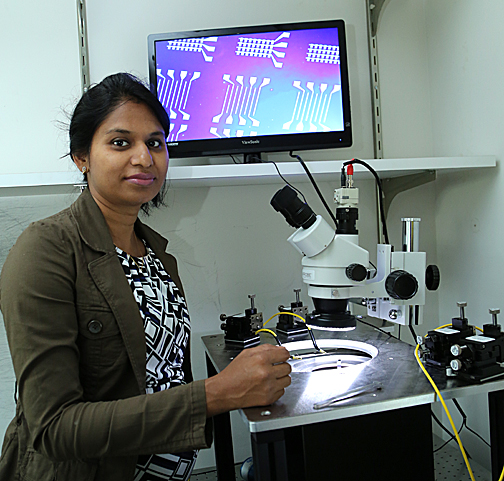Smartphones have transformed the way we communicate and organize our lives, but what if those electronic personal assistants could understand us a bit better?

Dr. Rashmi Jha is working on a smartphone computer chip that can learn, evolve and anticipate your needs.
“The human brain, which also is a memory device, is very robust. Consider how we can recognize a friend’s voice even if it is hoarse due to a cold. Computers are not good at that,” Jha said. “We are working to make a trainable memory device that over time will be able to make those types of recognitions and associate memories to better respond to our needs.”
Jha has received one of the National Science Foundation’s most prestigious grants, the Career Award, to pursue her research. The $442,000 grant, a U.S. patent in this area, a partnership with the IBM Watson Research Center, and active collaboration with Dr. Scott Molitor, UT associate professor of neurophysiology, are contributing to making this brainy smartphone a reality.
The nanoelectronic memory devices being created in Jha’s lab can store substantially more data than what is currently available on other devices while using very low power. While not able to completely replicate as many synapses as those of the efficient human brain, they can mimic certain functionalities of a biological synapse responsible for learning and decision making, Jha said.
“The goal is a chip using devices based on new material compounds that can learn, evolve and make decisions as a human brain, but admittedly on a smaller scale,” she said.
While anyone could benefit from a smarter smartphone, such as one that notices you are upset and gives you suggestions to cheer up or uses present and past grocery lists to give you suggestions of what to make for dinner, Jha said she anticipates such a device would be able to assist people with disabilities and those with memory loss. A device that can sense when you are lost and help get you to your destination or recognize individuals and help remind you who they are could be of great value, she said.
“In the last few years, many of the advancements to smartphones have been cosmetic, such as a larger screen or a little bit of a better camera or battery-life, but we are at the point now where new innovation is wanted and needed,” Jha said.